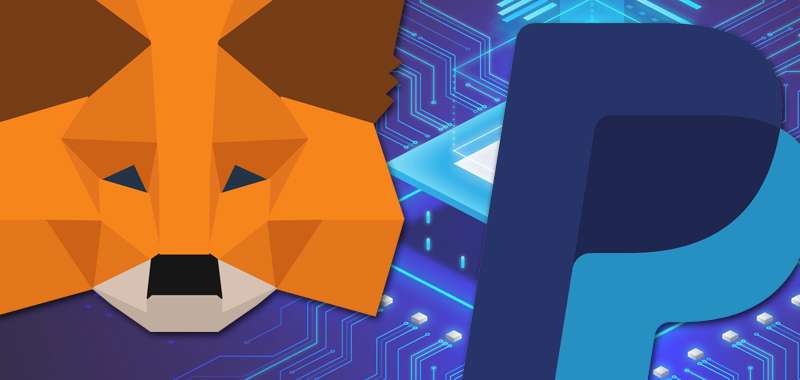In the world of digital payments, innovation and adaptation play a pivotal role in maintaining relevance and satisfying user needs. In this dynamic ecosystem, PayPal, a leading global payments company, has made a significant stride forward. The company’s integration with MetaMask, a popular Ethereum wallet, has now enabled US customers to make Ethereum payments. This move is not just an advancement in PayPal’s technological infrastructure but also a substantial evolution in the sphere of mainstream cryptocurrency acceptance.
MetaMask, a web3 wallet, allows users to interact with the Ethereum blockchain, providing the ability to manage various Ethereum-based tokens. Its integration with PayPal marks a momentous development in the digital currency realm. The integration empowers PayPal’s extensive customer base to leverage the potential of Ethereum’s blockchain and participate in decentralized finance (DeFi) transactions, which was previously a complex process for the average user.
PayPal’s Journey Toward Crypto
Before delving into the specifics of the MetaMask integration, it is critical to understand PayPal’s journey towards crypto acceptance. The company, founded in 1998, initially focused on enabling traditional fiat-based transactions. However, recognizing the increasing prominence of cryptocurrencies, PayPal made a strategic shift. In 2020, it began allowing US customers to buy, sell, and hold Bitcoin, Ethereum, Bitcoin Cash, and Litecoin. This marked PayPal’s first significant step towards integrating cryptocurrencies into its platform.
The MetaMask integration signifies the next phase of PayPal’s crypto strategy. By facilitating Ethereum payments, PayPal is not only expanding its service offerings but also strengthening its position as a frontrunner in the digital payments industry. The integration demonstrates PayPal’s proactive approach to embracing disruptive technologies, aligning itself with the evolving needs and expectations of its users.
The Integration: Bridging the Gap
The integration with MetaMask is groundbreaking because it essentially bridges the gap between traditional financial systems and decentralized blockchain technology. By enabling Ethereum transactions, PayPal has opened the door for its users to participate in the burgeoning DeFi space, providing access to a multitude of decentralized applications (dApps) and services, including decentralized exchanges (DEXs), lending platforms, and more.
This is a significant leap towards the mainstream acceptance of cryptocurrencies, particularly Ethereum. Ethereum, unlike Bitcoin, is not just a digital currency but a platform that supports smart contracts and dApps. By enabling Ethereum transactions, PayPal is not only facilitating a new form of payment but also providing access to a whole new world of financial services and applications.
The Impact on US Customers
For US customers, this integration translates into greater convenience and expanded financial possibilities. They can now easily make payments, send money, and conduct transactions using Ethereum, a feature previously restricted to traditional currencies. Moreover, they can now delve into the world of DeFi, leveraging Ethereum’s platform to engage in peer-to-peer lending, yield farming, and more.
Future Implications
The ramifications of PayPal’s MetaMask integration extend beyond immediate user benefits. It is a clear signal of the rising acceptance of cryptocurrencies and blockchain technology in the mainstream financial world. PayPal’s move may prompt other major financial institutions and payment platforms to follow suit, accelerating the global adoption of cryptocurrencies.
This integration also signifies a substantial development for the Ethereum ecosystem. It could potentially lead to an increase in the value and usage of Ether (ETH), the native cryptocurrency of Ethereum. Furthermore, it could catalyze the growth and development of the Ethereum ecosystem by driving more users and developers towards Ethereum-based dApps and DeFi platforms.
In conclusion, PayPal’s integration with MetaMask is a landmark development in the digital payments industry. By enabling Ethereum payments, PayPal is not only enhancing its service offerings but also facilitating a significant shift towards mainstream crypto acceptance. It marks the fusion of traditional financial systems with the innovative realm of blockchain technology, creating new opportunities for both consumers and developers.
For consumers, this integration provides unprecedented access to Ethereum’s vast array of decentralized applications and financial services, offering them the ability to explore and engage in the expansive DeFi landscape. For developers, it potentially signifies an influx of new users, thereby driving the expansion and development of the Ethereum ecosystem.
Moreover, PayPal’s move serves as a powerful testament to the growing acceptance of cryptocurrencies in mainstream finance. This could prompt other industry giants to incorporate crypto transactions into their platforms, accelerating the worldwide adoption of digital currencies.
However, the integration also presents new challenges. The technical complexities of blockchain transactions, coupled with regulatory uncertainties surrounding cryptocurrencies, require careful navigation. The ability of PayPal, and other similar platforms, to effectively address these issues will significantly influence the path of crypto integration in the wider financial ecosystem.
Ultimately, PayPal’s MetaMask integration is a bold step towards a future where digital currencies coexist with traditional ones, offering consumers more choices and flexibility in their financial transactions. It will be interesting to watch how this integration unfolds and shapes the future of digital payments.






